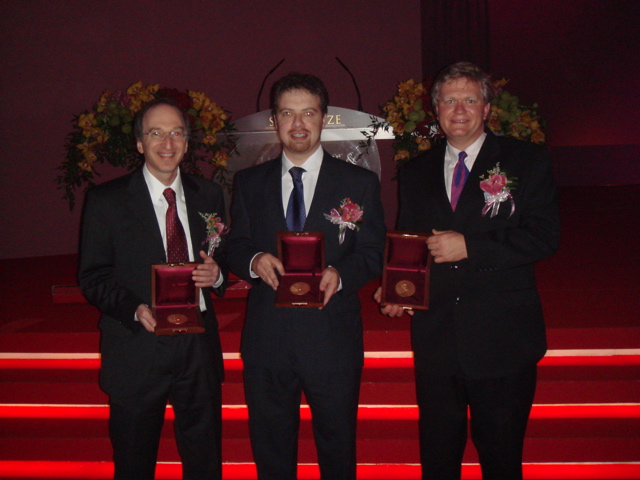This year Thomson Reuters might, for the first time, be lucky.
My prediction is that the 2010 Nobel Prize in Physics will go to the discoverers of the cosmic acceleration: Saul Perlmutter, Adam Riess and Brian Schmidt. Perlmutter will pocket half of the 10 million SEK prize money, and Riess and Schmidt will share the other half.
What makes me so confident?
The discovery of the speeding up of the cosmic expansion twelve years ago turned cosmology on its head. Suddenly the generally accepted model of the cosmos contained more than three time as much stuff. And more importantly, the new observations made it clear that the abundant additional stuff can not be more of the known substance, but rather must be some strange stuff that leads to apparent anti-gravitational effects. This strange stuff became known as 'dark energy'.
Twelve years later theorists are still debating the correct interpretation of the enigmatic speeding up of the universe and the nature of dark energy. Regular readers of this blog will know that I am not a fan of the concept of dark energy as an explanation of the speeding up of the universe. In fact, I have entertained an alternative explanation of this cosmic speeding up that does not require any such strange stuff.
The fact that more than a decade after the discovery of the cosmic speeding up there is still debate about its interpretation, does not make its presence in any way less certain. On the contrary, several independent observations have corroborated the discovery of Perlmutter's and Riess'/Schmidt's groups. The ongoing debate just highlights the fact that the discovery of the cosmic acceleration forces cosmologists to overhaul their models in such dramatic ways that their is bound to be controversy on what is the right approach.

Saul Perlmutter, Adam Riess and Brian Schmidt (from left to right) at the 2006 Shaw prize award ceremony. Soon the same line-up in Stockholm?
The discovery of the cosmic speeding up has led to truly gigantic numbers of theoretical publications dealing with dark energy or alternative theoretical models attempting to explain the acceleration. The shear number of such publications is perhaps best illustrated by the abundance of news articles on dark energy here at Science2.0.
A snapshot:
- Dark energy: is the theory of gravity wrong?
- Dark matter and dark energy: two faces of the same coin?
- Dark energy? No, phantom energy, say these cosmologists
- Dark energy stifling growth in the universe say researchers
- Dark energy survey camera gets one step closer
- BigBOSS joins the hunt for elusive dark energy
- New model suggests dark energy froze the universe
- Baryon oscillations and the search for dark energy
- Relic abundance of stable dark energy may be less than thought
For me it is almost unthinkable that a discovery that changed our view on the cosmos in such a dramatic way would not attract a Nobel prize. And: it's about time. Earlier Nobel prizes for cosmological discoveries such as the prize for Penzias and Wilson in 1978 (discovery of the echo of the big bang) and the prize for Smoot and Matther in 2006 (systematic measurement of this echo) were in both cases awarded about twelve years after the key measurements were published. And twelve years since the discovery of the cosmic acceleration, that is ... now!
And for those who believe in the predictive value of time trends: the recent Nobel prizes in physics awarded for astrophysical research, were awarded in 2002 (Giacconi, Davis and Koshiba) and 2006 (Smoot and Mather). A prize for Perlmutter, Riess and Schmidt this year would fit perfectly well in a four year cycle.
Seven days from now we will know if the Royal Swedish Academy of Sciences has done its homework.
--------------
Want to know more about dark energy and the cosmic acceleration? My initial blogpost holographic dark universe explains the dark energy problem in laymen's terms.
It also suggests an alternative (holographic) interpretation of the cosmic acceleration. As I am one of those who doubt the existence of dark energy, I have deepened these thoughts in a series of blogposts that explore an entropic origin of the cosmic expansion (for a summary see
It-from-bit: How to get rid of dark energy).



Comments